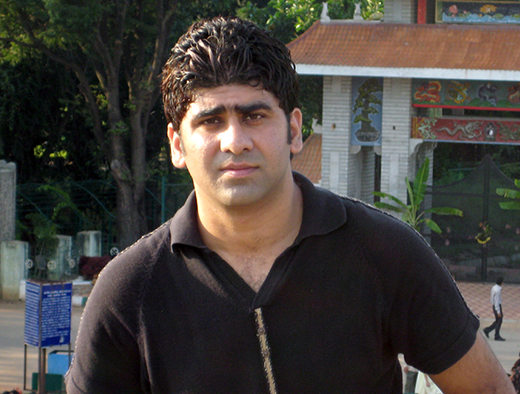A young entrepreneur’s experiment with the traditional art of adoring ceilings with Khatamband made him explore polystyrene instead of wood. Riyaz Ul Khaliq reports
Yasser Yousuf Khan was born to an educationist in the uptown area of Srinagar. Graduating in computer sciences from Oxford College, Bangalore, Yasser was interested in pursuing a different line of thought.
It was 2010 when Yasser returned from the Silicon Valley, the year Kashmir was up in arms against civilian killings. However, for Yasser it was the start of a new journey quite alien to his family background.
Yasser surmised the thought of manufacturing a Polystyrene Khatamband. Khatamband is a unique craft which involves the conjugation of geometrically designed wooden pieces without the aid of nails adorning the ceiling of rooms. It is largely believed that this art was introduced in Kashmir by Mirza Hyder Douglat in 1541 and with the passage of time it has become a part of Kashmir’s culture commonly embellishing the ceilings in shrines, houseboats, and historical places. However, some other theories suggest that Shah-I-Hamdan, a highly revered saint brought it along from Persia in 14th century.
“Since the traditional Khatamband is made out of wood, as such it needs a huge quantity of timber which can be hazardous to the debilitating environmental imbalance that has already set in,” says Yasser Khan.
The thought that tradition of installing Khatamband ceilings is dying because of high costs made Yaseer to explore ways to protect the ancient craft.
“There was an urge as well to save Kashmir from ecological disaster that can strike if the cutting of trees continues unabated,” says Yaseer.
This led to the innovation of a new kind of Khatamband which is Polystyrene-based, resistant to heat and cracks besides lasts longer than the wood carved Khatamband, claims Yasser.
An eco-friendly innovation that has potential to stop further degradation of the environment, Yasser espouses that it was his own innovation, “a Gift from Allah” he believes.
Yasser decided to give this thought a try and his next journey started. This new cruise proved to be an evolution of his life. From a technocrat to an entrepreneur, he had to undertake some more expeditions to other states visiting Maharashtra and Pune.
“I had to purchase raw material from outside valley. The Polystyrene frameworks were also manufactured outside the valley,” Yasser explains.
The initial phase was full of hurdles for Yasser but he didn’t budge rather overcame such obstacles with great confidence. Despite difficulties, Yasser persisted with his efforts to carve out a niche for himself in the universe of entrepreneurship. This stage was a kind of transition for Yasser. Trained to handle delicate machines and software, Yasser had to learn the manual art of fitting Khatamband himself.
“Initially I brought manpower from outside valley, but gradually I had to take upon the mantle myself and had to learn this art,” says Yasser. Finally, when his hands gained the skill, he began imparting it to other persons from the valley. “Around 50 persons are directly or indirectly involved in his enterprise,” Yasser asserts.
Yasser established Star India Plastic Industries at SIDCO, Industrial Complex, Khanmoh, Srinagar in 2012. It marked his beginning as a professional entrepreneur. And he successfully accomplished this feat when his enterprise started production in 2013. But for an entrepreneur, a good launch is only a beginning. Enduring the competition and emerging out successful is what differentiates a novice from a professional. His education in computer sciences had disciplined him to a great extent as such facing the other similar ordeals with audacity was ingrained in his blood. The new art proved easy for his delicate hands as he mastered it in a short span.
“The most difficult thing in this project was that it was new and people were not aware of it,” he says.
Yasser claims that the Polystyrene made Khatamband is the heat absorber. “There will be no change in normal temperature if we use Polystyrene instead of wood. It is heat absorbent,” he says. “Also, this Polystyrene made can resist heat up to 90 degree Celsius while below minus 35, it will start to brittle.”
Convincing the people about its viability sounded more important and urgent for tasting success. For achieving this, Yasser approached several agencies including JKPCC, JK Tourism Department and several other private hotels who proved to be ready buyers, a huge encouragement for a budding entrepreneur. “My product is being used in several government departments, besides several other private constructions are adorning my Polystyrene-based Khatamband. All my customers have applauded my efforts as well as my products,” boasts Yasser.
The most interesting thing about Yasser’s work is that the Polystyrene-based Khatamband closely approximates the wooden Khatamband. “My Polystyrene-based Khatamband is wood coloured as such it is hard to differentiate between the two,” says Yasser.
Yasser besides manufacturing quality finished product has also started experimenting with new designs to add glitter to his trade. Yasser hopes that his efforts will help protect environment besides promoting culture and tradition unique to our society.

















